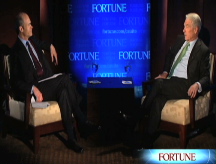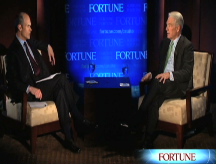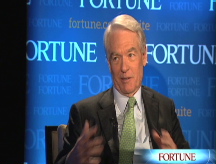Charles Schwab: It will get better
When will the market roar back? A lot sooner than you think, says the veteran investor.
 |
| Charles Schwab |
 |
| On the cover of the May 13, 2002, Fortune: Schwab at age 13 |
(Fortune Magazine) -- Charles Schwab, 71, has a better perspective than most on the recent Wall Street free fall.
He's seen a lot in 37 years of running the company he founded and has navigated successfully through expansions, recessions, irrational exuberance, and crashes. He has also managed his firm through revolutions in the financial industry, from deregulation of the brokerage business soon after he started to the advent of the Internet.
Today Charles Schwab & Co. (SCHW, Fortune 500) holds close to $1 trillion of client assets (the figure fluctuates as wildly as the markets), and Schwab himself is a multibillionaire.
His role has fluctuated too. He handed the CEO job to company veteran David Pottruck in 2003, then took it back in 2004 as performance faltered; on Oct. 1 of this year another longtime company executive, Walter Bettinger, became CEO while Schwab remains chairman.
Fortune's Geoff Colvin talked with Schwab about what investors should do now, who's to blame for the financial system's crisis, the economy's future, the keys to being a successful entrepreneur, and much else. Edited excerpts:
How is the firm doing through this turmoil? You have a bank, which some people may not realize, and you're even in the mortgage business.
Schwab has been and is in great shape. We never got into some of the more toxic things that you read about. We have a $25 billion bank, which we started five or six years ago, and we do provide mortgages to our clients. We don't go outside of that, and fortunately the correlation between saving and investing on the one hand and having a high credit score on the other is very high. We have a very teeny delinquency rate. We're a pretty conservative group of people.
Has the fact that government is a part owner of AIG (AIG, Fortune 500) and of several banks forever transformed the way these firms will be managed and the way investors will regard them - figuring that if Washington did it once, it might do it again?
I think it'll affect their valuations negatively for a long time to come. But there are many examples in our history where an industry has fallen on troubled times and been rescued. In the early 1990s the Resolution Trust Corp. stepped in and took over all the sick savings and loans, and it worked pretty darn well. There are many other examples where it generally works out okay.
Sometimes it costs the government a little bit, but the risk to the system is so incredible that it's necessary for government to step in. I consider myself pretty conservative about things, but there are times of stress when government does have a role, and clearly today is one of those times.
Are there aspects of good news for you in this situation? Your trading volume has gone through the roof.
That's the terrific part of the whole thing, but I really hate seeing our clients get knocked back by 30%, 40%, 50%, in the equity portion of their portfolios. It's really not a happy long-term situation. But it will change. It will get better. I guarantee it!
Great. When?
It will get better definitely after Obama has his team together and is able to submit to the public what he's going to do. He's got some wise people around him who will probably put together a pretty comprehensive and thoughtful strategy, and I think that will add exactly what we need to improve confidence.
If you could put a couple of items near the top of Obama's agenda, what would they be?
He has said he would reduce taxes for 95% of the population. I would have him keep that pledge but announce that for the other 5% there will be no change in their tax rate for at least three years.
That would probably send the stock market really turning around. A tsunami of uncertainty has been created by the election and by the agenda he suggested in the campaign. Lots of people are worried about taxes and have been selling.
I would then suggest that he come out with a strong agenda with respect to infrastructure investments. It will probably cost well above $1 trillion. This is bigtime stuff. It might even go toward $2 trillion, but we've got to make that investment. I think we could handle it.
Those are staggering sums. The immediate fear seems to be deflation, yet a government that spends that much money might create a longer-term inflation problem. How do you come down?
When you get into a situation like we're in and will be in over the next several years, there will be government assistance that has the potential for creating inflation at a fairly high rate. There are known ways to moderate that. Right now the velocity of money is really down, so there's an opportunity to make the investment we need to make. I think you can do it with modest inflation.
A moment ago you said this is a situation we're going to be in for several years. Really that long?
It depends on government policies. There are a few things that we have to avoid, at least for now.
Certainly increasing taxes is one of those. You've got to expand your money supply. You've got to be careful about giving too much power to trade unions because if you reduce output per man-hour, that would lead to many more difficult times. That's how recessions move to depressions.
Should Washington rescue the American auto companies?
I agree with the camp that says there should be an organized bankruptcy. Maybe the government could put something into the pot. But they should go through a bankruptcy proceeding.
That may sound a little severe, but there needs to be some major overhaul of their massive cost structure. If you do a little bit now, you're going to have to do a little bit next year and a little bit the year after, and for the rest of your lives you're going to be sending checks to the auto companies.
Are stocks cheap?
By any measure they're absolutely cheap. Could they get cheaper? Yes. Just because a stock is down doesn't mean it's a great buy. But after 18 months of decline, the equity markets are really, really cheap for the long term. You still have to remain well diversified, and you have to think about asset allocation. You've always got to think about having some fixed income in your portfolio as well as equities.
-
 The retail giant tops the Fortune 500 for the second year in a row. Who else made the list? More
The retail giant tops the Fortune 500 for the second year in a row. Who else made the list? More -
 This group of companies is all about social networking to connect with their customers. More
This group of companies is all about social networking to connect with their customers. More -
 The fight over the cholesterol medication is keeping a generic version from hitting the market. More
The fight over the cholesterol medication is keeping a generic version from hitting the market. More -
 Bin Laden may be dead, but the terrorist group he led doesn't need his money. More
Bin Laden may be dead, but the terrorist group he led doesn't need his money. More -
 U.S. real estate might be a mess, but in other parts of the world, home prices are jumping. More
U.S. real estate might be a mess, but in other parts of the world, home prices are jumping. More -
 Libya's output is a fraction of global production, but it's crucial to the nation's economy. More
Libya's output is a fraction of global production, but it's crucial to the nation's economy. More -
 Once rates start to rise, things could get ugly fast for our neighbors to the north. More
Once rates start to rise, things could get ugly fast for our neighbors to the north. More













